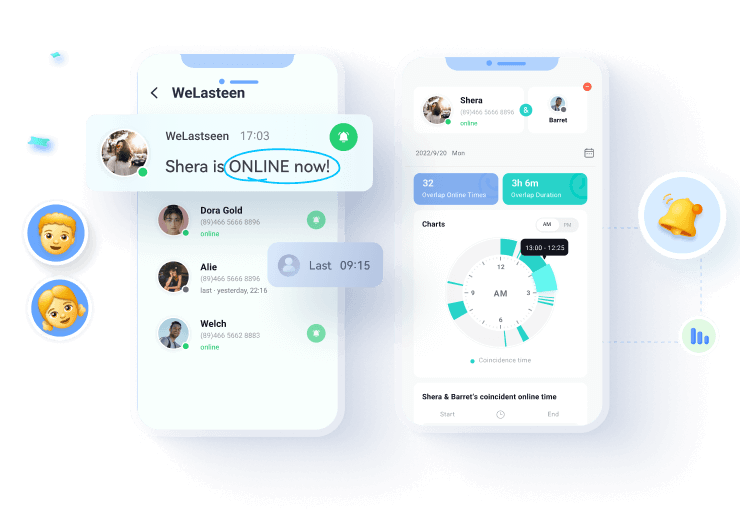When parents give their children smartphones, they usually worry about online safety. As we know, communication has become easier with instant messaging apps, but threats have also increased. Among these concerns is WhatsApp sexting, where users exchange explicit messages or multimedia. Many teens may not fully understand the risks because their messages are private.
You should know that once something is sent, it can easily be shared or misused, leading to serious problems. That's why parents need to educate their kids about digital behaviors and check their online activity. By monitoring the signs of wrong usage, you can protect your kids from bad habits and screen use. Thus, this article will explore the reasons behind sexting, the risks involved, and ways to protect privacy.
In this article
Part 1. Why Teens Use WhatsApp for Sexting?
As mentioned earlier, instant messaging makes communication easy but creates unsafe situations. Several factors influence this behavior, which makes WhatsApp a growing problem for sexting. Let's dive below to find key reasons why teens engage in such conversations:

- Exploration: Teenagers are naturally curious about relationships and personal identity. They may not fully understand the endless impact of sharing personal content.
- Social Stress: When teens' social circle engages in bad chats, they may feel pressured to do the same. Plus, they might worry about losing friendships or being seen as different if they refuse.
- Privacy: Messaging apps give the impression of private and secure conversations. They believe that their chats will stay hidden from parents and teachers.
- Relationships: Kids use messaging applications to connect with their partners and express emotions. Sometimes, they may exchange personal content as a sign of trust or affection.
- Accessibility: Unlike face-to-face interactions, digital messaging removes the fear of immediate consequences. This accessibility can uplift this bad behavior without much thought.
Part 2. Signs to Check If Your Kid is Involved in WhatsApp Sexting
Although understanding why they engage in free WhatsApp sexting is essential, recognizing warning signs is just as important. Many parents might not notice these behaviors initially, but small changes in their kid's actions can reveal hidden issues. Below, we will explore various signs that parents can step in early and guide their children toward safer digital habits:

- Increased Secrecy: If your child suddenly becomes more protective of their phone, it could be a sign of bad conversations. Plus, they might keep their screen away from view or quickly close apps when someone walks by.
- Midnight Phone Usage: When your kid uses their device long after bedtime, it may suggest they are engaged in secret conversations. It usually happens when they don't want parents or family members to notice their activities.
- Mood Swings: Teens involved in destructive online activities may experience emotional stress. If your child suddenly becomes more withdrawn and irritable, it could be due to pressure from someone they are messaging.
- Delete Messages: Frequent message deletion without an apparent reason may indicate inappropriate exchanges. If your child regularly clears their chat history, it could mean they are hiding conversations.
- Lock Certain Apps: Teens who chat secretly often use app locks or hide certain apps from their home screen. When your child suddenly starts using passwords or locking apps, it could mean they are trying to keep something private.
Part 3. What Are the Major Risks of Free Sexting on WhatsApp
Upon recognizing the signs of bad online behavior, parents must also know the risk of sexting. Free sexting on WhatsApp may seem harmless to kids, but it can be saved or misused when something is sent. Thus, explore the below-mentioned points to find the significant risks and help parents guide their children toward safer digital habits:
- Data Leaks: Messages and images sent in private conversations are not always secure. If someone takes a screenshot or saves shared content, it can be exposed without permission.
- Public Shaming: Teens who share personal content may later become victims of online bullying. If their private messages or images get leaked, others might use them to harass or embarrass them.
- Blackmail: Someone who receives explicit content may use it to manipulate or control the sender. Unless demands are met, threats to share private messages can lead to fear and stress.
- Emotional Effects: In case something is exposed, the sender may feel ashamed, which leads to depression. Even if nothing happens immediately, fear of potential exposure can cause long-term emotional stress.
- Social Relationships: Parents, teachers, and friends may react if they find out about inappropriate online behavior. This can make teens feel misunderstood or isolated from their support system.
Part 4. Best Apps to Check If Your Kid is Involved in WhatsApp Sexting
As discussed earlier, WhatsApp sexting can lead to some private data leaks and emotional distress. Parents who suspect their child is involved in unsafe online behavior may need tools to monitor their activity. Thus, the following section will provide you with the two best options to monitor your kid’s online activity and protect them from bad habits:
1. WeLastseen
If you find your kid engaging in private talk with someone you know, you should monitor their activities. Many teens hide their online presence, which makes it hard for parents to track their behavior. Free WhatsApp sexting can happen without parents noticing, especially if the last-seen status is hidden. A reliable tracking tool like WeLastseen can help parents stay informed about their child's activity.
This app allows parents to track multiple accounts simultaneously, making monitoring different contacts easier. Plus, you can compare two different accounts' activities to see when both of them are online. This helps parents see if their child is spending excessive time chatting with a specific person. It also allows access to past data and makes it possible to analyze changes in online behavior.
Key Features
- Detailed Data Analysis: Users can view the historical online activity and analyze past patterns to see if there are any common activity patterns.
- Tagging Specific Time: This feature allows users to highlight specific time slots and track activity during those periods.
- Instant Alerts: They help parents stay aware of their children's and others' activities without constantly checking manually.
How to Using WeLastseen to Check If Your Kid is Involved in WhatsApp Sexting?
Upon exploring its innovative tracking features, follow the guide below to track your kid’s online activity with another person:
Step 1. Access WeLastseen to Check Your Kid’s Activity
Begin this process by installing the WeLastseen app on your smartphone. Afterward, open the app and hit the “Add Contacts” button from its main screen. Next, you need to grant access to your contact list to assist you in adding contacts for monitoring purposes.
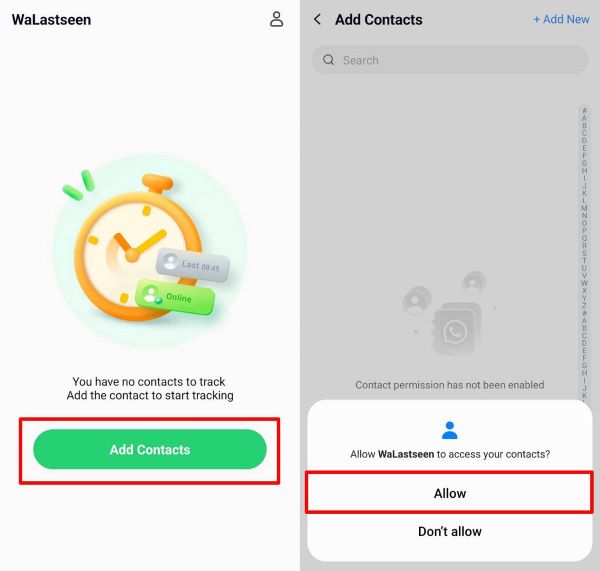
Step 2. Add Your Child and Start Monitoring
After accessing the contact list, press the "Add" button next to your kid's contact details. Then, select the "Country Code" and press the "Start Tracking" button on the following screen to continue with this task. Choose the preferred pricing plan and press the "Buy Now" button to complete the contract inclusion.
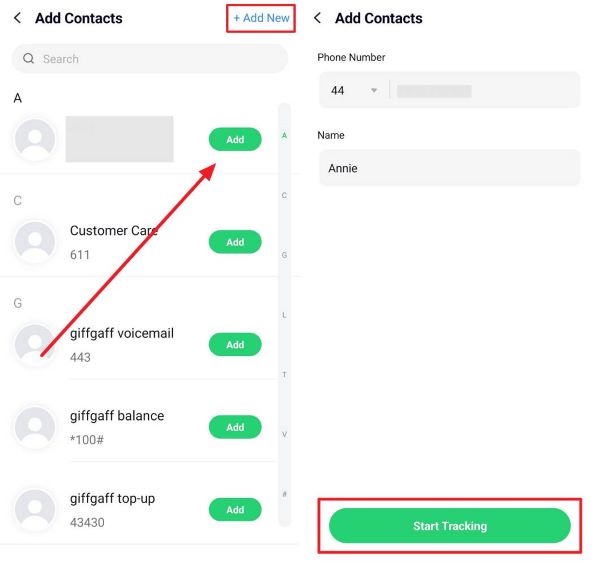
Step 3. Add Another Contact for Tracking
Once you’ve added the first number, press the “+ Add Contact” button to open a new screen. From this point, tap the “Add” button next to the contact whose online activity you want to compare with your kid. Then, select the country code and press the “Start Tracking” button to add this contact for tracking purposes.
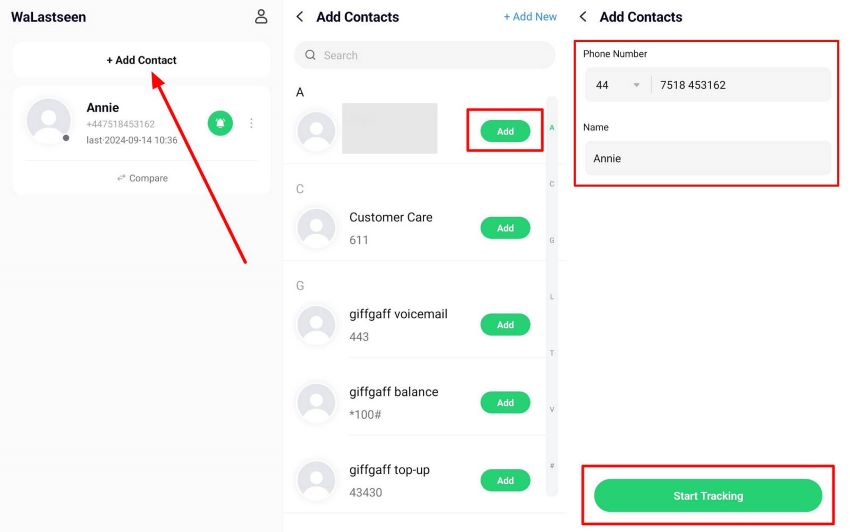
Step 4. Compare Both Contacts Activities
When both numbers are included in WeLastseen's primary interface, press the "Compare" button and validate the contact choice by tapping the "OK" button. This app will present statistics that display the overlapping online times of both added contacts.
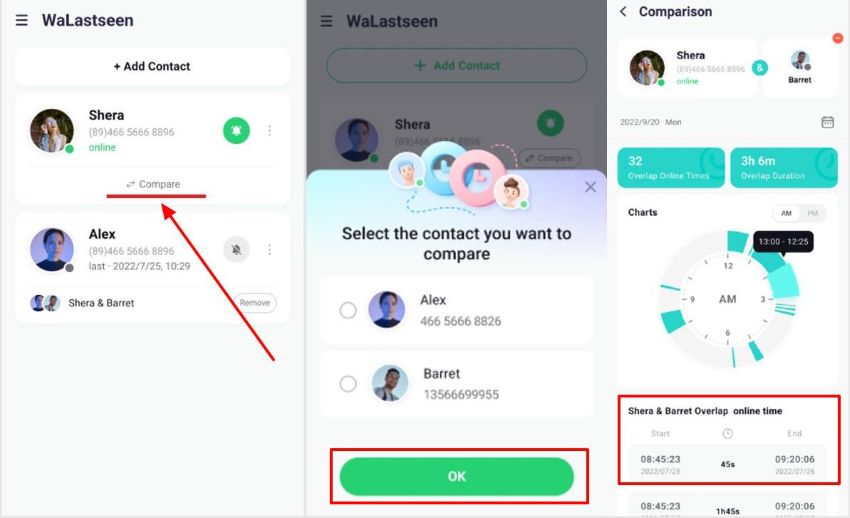
2. FamiSafe - Screen Viewer
FamiSafe is another option to help parents detect their kids' activities when they are involved in WhatsApp sexting. It offers a dedicated Screen Viewer feature that captures real-time and scheduled screenshots of a child's screen. Instant screenshots provide quick insights, while scheduled captures at set intervals allow continuous monitoring. Another key feature of FamiSafe is its ability to detect explicit content within images.
Parents receive quick alerts when any mature or adult images appear on the child's device. A suspicious filter organizes such content into a secure gallery for review to protect kids from harmful exposure. It also works across any device by allowing parents to see what their child is viewing on different platforms. So, follow the steps below to set up FamiSafe and view your kid’s activities:
Step 1. To start, parents must install and launch this app on their phones and tap the "Start" button. Then, a "Security Code" will be displayed on the next screen, which they need to store somewhere.
Now, launch the application on your child's phone and enter the copied security code. Next, press the "Enable Now" button to allow access and tap the "Turn On Now" button to connect both devices.
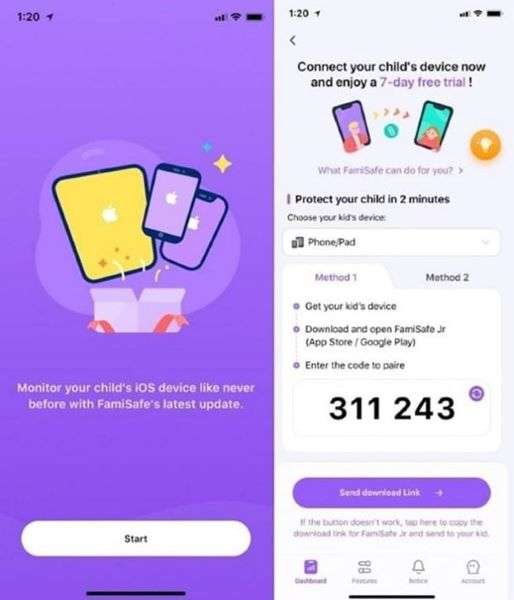
Step 2. Afterward, navigate to the "Features" section on the parent's device. Next, choose "Screen Viewer" from the "Device Activity" section to move further.
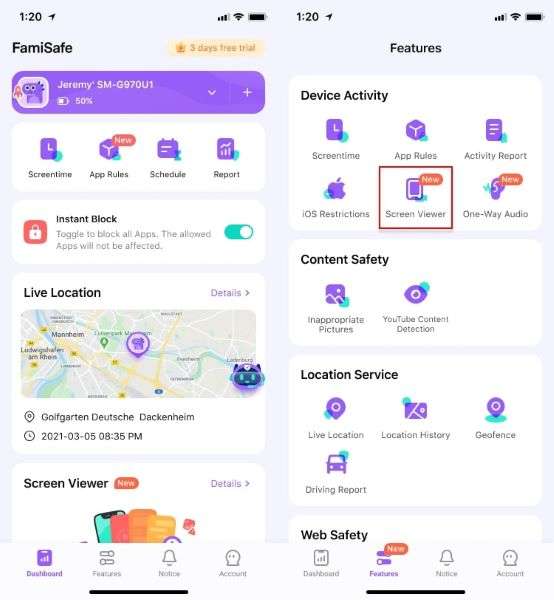
Step 3. Press the "Enable" button and proceed to the "Settings" tab. Afterward, activate the “Enable Screen Viewer” switch and choose the “Interval” for screen captures. Once this is done, the application will notify you if any bad content is detected. You can examine all pictures in the “Screen Gallery” by activating the “Suspicious Filter” feature.
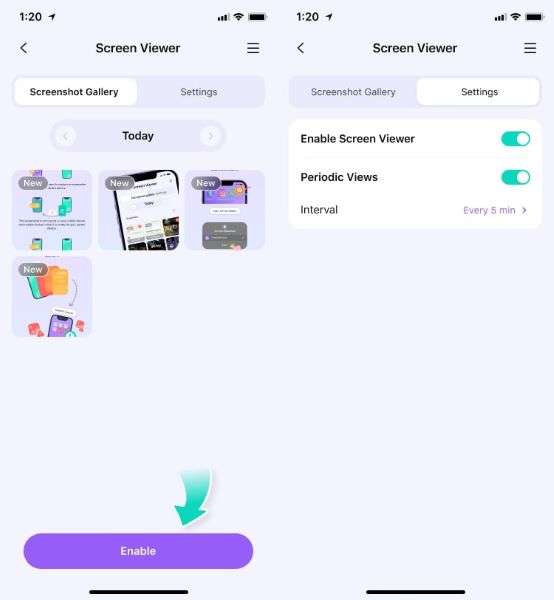
Part 5. How to Help Your Kid Avoid WhatsApp Sexting
While monitoring tools help, teaching kids responsible digital behavior is equally important. Open conversations and guiding them through safe internet practices can prevent free WhatsApp sexting. Parents must take proactive steps to build trust and educate their children. Below are some key ways to help avoid wrong online behavior:
- Talk Openly: You should explain how private messages and images can be misused. Plus, it uplifts them to ask questions and express concerns about their online experiences.
- Set Boundaries: Parents must establish rules about online behavior, including what content is appropriate to share. Then, they should let kids know which conversations are unsafe and explain the consequences of breaking these rules.
- Use Monitoring Apps: These applications offer features like screen monitoring and content filtering to help track a kid's activity. Apps such as FamiSafe provide alerts for destructive content by allowing parents to take action before serious problems arise.
- Develop Trust: Instead of strict monitoring, you should create an environment where your child trusts you. Also, let them know they can come to you for help without fear of punishment.
- Monitor Changes: Sign s of secrecy or withdrawal from family activities may indicate online problems. In such situations, you must pay attention to these changes and address them carefully.
Conclusion
To wrap up, sexting is a growing habit among teenagers who may not fully understand its cons. That's the reason parents should guide their kids openly toward responsible digital habits. Plus, monitoring tools and open discussions create a balanced online safety approach.
For those who suspect their child may be involved in risky conversations, the WeLastseen app is an excellent tool for tracking WhatsApp. This dedicated app helps parents stay informed and take action when needed, ensuring a safer digital experience. So, you must install and try the WeLastseen app today to track your kid's WhatsApp sexting activity.
- Track WhatsApp contacts' last seen status.
- Get instant online and offline notifications of them.
- Analyze their WhatsApp daily usage.
- Compare chat probabilities of two contacts.
FAQs
-
Q1. Why do teenagers use messaging platforms for sexting?
They use messaging platforms for sexting due to privacy and ease of communication. It also provides a sense of security by allowing them to explore relationships. A lack of awareness about its cons further uplifts this behavior among teenagers. -
Q2. Can monitoring apps help parents prevent sexting?
Yes, it helps parents track their child's online activity to prevent them from sexting through WhatsApp. Tools like WeLastseen allow parents to check when their child is online on WhatsApp and compare interactions with others. Plus, apps like FamiSafe monitor screens and alert parents about explicit content. -
Q3. What should parents do if they find out their child is sexting?
When parents discover their child is involved in this habit, they should remain calm and avoid reacting with anger. You can use monitoring apps like WeLastseen and FamiSafe, which provide additional support if necessary.










